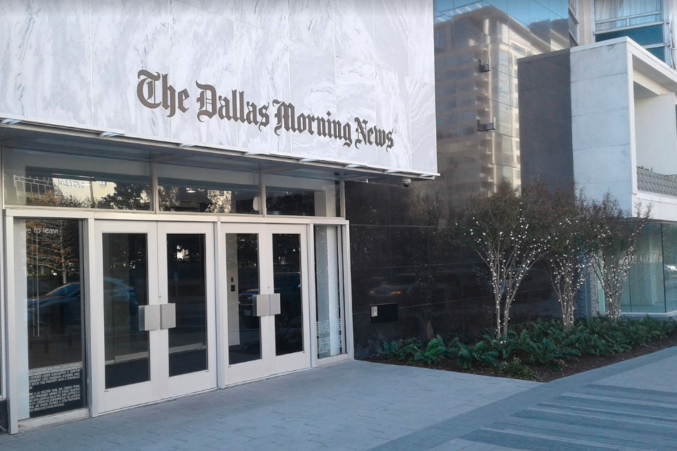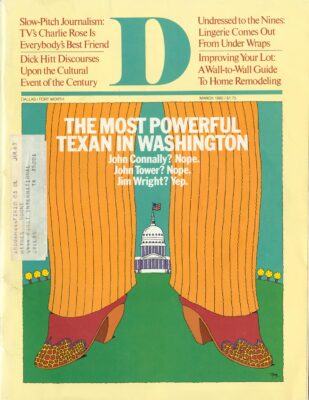At a few minutes to nine on a Friday morning, 200 people, mostly women, sit restlessly under the bright lights of a large studio at Fort Worth’s KXAS-TV. They have come to “experience live television” in person and to meet the talk show host who has everybody talking. Charlie Rose makes his entrance from the back of the studio, bounding into the audience, microphone in hand. “This show succeeds because of you,” he begins. “Be a part of it. Tell us what you think. And remember, there is no such thing as a bad question.” If his listeners doubt his sincerity, they are reassured when Rose abruptly bends over, straightens up, and says, “I am so nervous – why am I so nervous?”
Charlie Rose has a gift for putting people at ease. Tall, blandly handsome, wearing a suit he looks on his way to growing out of, he is the definitive approachable media personality. Actresses promoting new movies and nutritionists selling new diets feel at home with Rose. But today, as the unusually large crowd attests, promises more than a casual look at lifestyles and health aids. Today, Rose hosts Cullen Davis, for his first appearance on a television talk show.
Perhaps in recognition of this extraordinary event. Rose has brought his notes for the show with him, and, oblivious to the technical crew shouting a countdown, he stands studying them. Cullen Davis sits serenely on the small stage. In another moment, the cameras are glowing and “The Charlie Rose Show” is on the air.
His nervousness vanished, Rose begins with a partial summary of the events that have placed Cullen Davis so permanently in the public eye: the battle with his ex-wife Priscilla through two sensational murder trials, one ending in a mistrial, the other in his acquittal. The introduction dispensed with, Rose proceeds with brief, general questions: How does Davis feel about having become a folk hero to some in Fort Worth? Has Davis’ life returned to normal? How’s business?
In time, several polite questions come from the audience. A woman asks Karen Masters Davis, seated in the audience, whether remodeling on the couple’s $6 million house is finished. Not yet, Mrs. Davis says. An elderly gentleman wants to know whether Davis’ immense wealth, which got him defense lawyer Racehorse Haynes, may have helped win an acquittal. Could be, Davis says. Rose asks Davis how he feels about the fact that some people remain convinced he is guilty of murder. Davis says he hopes those people are in the minority. Rose asks Davis how he feels about the 612 days he spent in jail during his ordeal. Davis says it was 615 and he doesn’t feel very good about it.
Excitement mounts for a moment when Davis says he knows who committed the murders he was charged with. Rose asks Davis to name the person, but he declines. There is laughter from the audience, and Rose drops the matter. A woman in the audience stands to pursue it: If Cullen Davis knows who is responsible for the crimes, why isn’t he doing something about it?
During a commercial break, Rose leans over to Davis and says, “Just tell me one thing about Cullen Davis – did he do it?” Then he laughs.
Charlie Rose is not exactly tough on his guests. His questions are deferential, the atmosphere on his show congenial. The approach has paid off, both with morning television viewers and his daily guests. People who turn down invitations from other talk show hosts say yes to Charlie Rose, and, for the most part, they have fun with him. Lady Bird Johnson has reminisced with him; Mary Martin has discussed her Broadway years with him; producer/choreographer Bob Fosse has reflected on the perils of commercial success with him. Scores of writers (including David Halberstam, Gary Cartwright, and Thomas Thompson) have stopped by to discuss – and promote – their latest works. Many guests return once or twice.
Rose is so successful at what he does that offers to syndicate his show began coming in when he’d been on the air just a few months, and at 37, he is probably justified in seeing recognition on a national scale as only a matter of time.
Success seems to have courted Rose. He graduated from Duke University and Law School, but after passing the bar in New York City, he turned to free-lance production for PBS and the BBC. In 1974 he became executive producer of “Bill Moyers’ Journal.” Two years later he was co-hosting a morning talk show in Chicago and getting to know Phil Donahue, now a close friend. When KXAS hired Rose as station program director and host of his own show last April, it was Donahue who persuaded him to try out the live audience-participation format.
“The Charlie Rose Show” was something of an overnight success. The local competition, WFAA’s pre-taped general topic program, “People,” suddenly found itself battling to keep its morning audience. By November, the Arbitron Ratings Book showed Rose solidly in the lead in the 9 a.m. slot, beating out its closest competitor, KTVT’s “Leave It to Beaver,” for total audience as well as for women viewers in the 18-49 age bracket – the most desirable segment for advertisers. In November, “The Charlie Rose Show” was tied with “People” for Dallas viewers, while in Fort Worth it had twice the audience. Arbitron listings for the first week in January show that Rose has substantially increased his lead: 83,000 households tune in to his show, compared to 26,000 for “People.” Rose has 72,000 women viewers in the 18-49 bracket, while “People” has only 14,000. Rose leads with the advertisers, and he now edges out “People” for the Dallas audience.
Charlie Rose’s success can be attributed at least in part to what is known as hammock scheduling, in which a new or lagging show is aired between two winners. Since a fundamental rule of TV programming is that a viewer will turn the channel only if he dislikes what he sees, the middle program can often pick up viewers from the other shows.
“The Charlie Rose Show” airs in the half-hour slot between NBC’s “Today” and “Donahue,” the number one talk show in the nation.
Rose thinks, though, that his show’s success has a lot to do with the live format – unique on the local scene – which gives the audience an opportunity to engage in discussion. And Charlie Rose likes to talk about the importance of discussion. “Audience participation is really the most important thing. My show is about people revealing themselves through dialogue.”
Rose says he sees the show as a learning experience for him as well as for others. There is no such thing as a bad question. When novelist John Cheever appeared on the show, Rose queried him in sequence on fiction in America, America in general, love and death in fiction, love and death in general. He asked J. Gordon Liddy about the American political and judicial systems. He asked actress Adrienne Barbeau how men and women are getting along these days. The pace is frenetic, the time is short, and the questions are wonderfully diffuse. The audience loves Rose for it. Where, they wonder, does this man get all his positive energy?
Perhaps, as Rose thinks, it was the way he was brought up. The only child of a smalltown lawyer in North Carolina, he remembers as a very young boy spending long afternoons down at the courthouse listening entranced as attorneys presented their cases. He was naturally inquisitive: “When I was a kid, I couldn’t wait for Tuesday because that’s when Time came out.” The inquisitive kid, it seems, is still there inside the man who now finds himself most at home in a television studio, surrounded by cables, lights, possibility, confusion. Charlie Rose’s nervousness is not always just a ploy.
In his second floor office at KXAS, Rose tilts himself back in a rocking chair and looks out the window to the west and downtown Fort Worth. It’s 9:45 a.m. and he looks tired, as if all his energy has gone into the segment he’s just finished with Cullen Davis. Disorganization and the backlog of work he has blocked from his mind for the last hour settle over him: the phone calls to make to possible syndication backers, tomorrow’s show to prepare for. Scattered on tables and on the floor are piles of books, magazines, press releases, tapes of his shows. A rumpled sports jacket and a collection of designer label ties hang on a coat rack in the corner. Underneath lie the jogging shoes he wears to work every morning. Tacked to a wall is a quotation: “It is better to debate a question without settling it than to settle a question without debating it.” Rose rocks himself forward and says, “What really fascinated me about the Davis show was the audience. Who are they? Where do they come from? What are they thinking?”
Charlie Rose is fond of posing the nonspecific question and letting it float off into the sphere of the rhetorical. Perhaps it is this lack of focus that makes it easy – as critics have done – to write off his interviewing technique as a poor, if studied, imitation of Phil Donahue’s. The problem with Charlie Rose, most of the time, is that he’s incapable of taking up a point and pursuing it.
“Television,” Rose explains, “is not neurosurgery. Thoroughness and absolute qualities are not what it is about. 1 just go out there every day with the limited time we have and no staff, no researcher, no producer, and try toask myself, ’Who is this person and how can I advance some dialogue in areas that are revealing?’ ” The implicit comparison is to Donahue’s large and well-organized research staff.
The argument has its merits. Rose’s staff is small. Until recently, he was both show host and station program director (a job he has phased himself out of), with little time for researching his guests. But there have been exceptions, notably Cullen Davis. In preparation for that show, Rose says he read books and newspaper articles, spent hours talking to reporters who had covered the Davis trials, talked to people who knew Davis.
Rose insists he made no pre-show agreements with Davis (who declined to appear on ABC’s “20-20” when he was told he couldn’t clear the questions first), and yet his questions were almost uniformly banal – “What do you resent most?” or, again, “What do you cherish most?” After the Davis show, a group of women in the ladies’ room said they felt as though they’d just sat in on a Cullen Davis fan club meeting. “I couldn’t believe Davis was getting off so easy,” said one. “I wanted to stand up and say what I thought, but it would have seemed so out of place.” (One wonders what she would have thought a week later when, after taping the last of three shows with Davis, Rose thanked him for coming, saying “I know it’s not easy to have people asking you questions.”)
Echoing Donahue’s plug for the average housewife (the principal audience for both shows), Rose says, “I trust the intelligence of the audience for me not to have to accent a point, and say, ’My God, how awful that is,’ when I think it stands there in full view.” Actually, conflict rarely surfaces. Most of Rose’s guests are on the show because they have something to promote – a book, a movie, a local dinner theater appearance. “The Charlie Rose Show” doesn’t pay guests (few talk shows do, making them very cheap to produce). Instead, guests get free publicity, and Charlie Rose is a first-rate promoter. (He did forget recently to plug The Amazing Kreskin’s book one last time before going off the air, and in the final seconds his guest could be heard yelling “Don’t forget my book!”) Rose seems most in his element with such “soft” shows. Perhaps it is that the focus for discussion has been provided. Perhaps it’s simply that everyone can relax and have a good time. Where does the show with Cullen Davis fit in? Well, says Rose, his priority is always “to create an atmosphere in which people want to communicate.” When that happens, people reveal themselves through dialogue. “I’m not sympathetic to Davis,” he says. Then, prodded by what seems an innate aversion to declarative sentences, he adds, “The questions were obviously susceptible to that kind of interpretation, but they weren’t meant to be. The intent wasn’t to re-hash the court trials and the past. What fascinates me is what makes Cullen Davis tick? Who are the characters in his drama? I viewed it as ’Here is this man that I don’t know anything about.’ I’m really after understanding.”
What Charlie Rose resents is being compared to Phil Donahue, his close friend and a source of much encouragement. (Rose has gone to Chicago to interview Donahue for his show and come away with a few choice compliments on his interviewing style.) The live format and the audience participation are, of course, Donahue’s trademarks. So are the hand gestures and the facial expressions that Rose has picked up somewhere along the way. But not, says Rose, the figures of speech: “You will never hear me say ’help me out’ on the air – ever. And it’s a natural thing for me to say. But I can’t do it because it looks like I’m imitating Donahue.” Minor inconveniences notwithstanding, Rose says the comparison begins and ends with “the surface basics between two people who have essentially the same format,” and he is probably right. Donahue is famous for his polite yet unrelenting questioning, and for his ability to strike at the heart of the matter, making the most likely comparison between the two the somewhat invidious one Rose comes up with himself a moment later: “He’s the A&P and I’m the Mom and Pop store.”
What Charlie Rose cherishes are his good intentions. It is, in fact, hard to picture his having a bad word for anyone or anything. Possibly it’s this determination to speak, at once, to all sides and predilections, that makes it so difficult to understand what he is trying to say. In describing his television persona he says, “1 care about people. I think watching the show you can tell that. You can’t do television if you sit on a kind of Mount Olympus, or live in an ivory tower, or feed on elitism. . .” And then, oddly, “. . .There is enormous need for people who do all those things.”
Rose himself seems not entirely clear about what point he is making, so he opts for someone else’s: “Nick Nolte said on my show that people are basically divided into two categories, emotional and mental. I think it is the pursuit of that question which has to do with all novels – Shakespeare was talking about character development and what makes people tick. Lear is different from Hamlet and they are propelled by different forces, and I think that is what people have constantly been fascinated by.”
Charlie Rose is full of questions; questions of how best to make use of the live format – “I’ve never done an interview that I didn’t feel ’why couldn’t I have found more experiential value, more shared experience?’ “; questions, now apparently largely resolved, of whether he has chosen his career wisely – “I used to question the value of television as a means of communicating. And you know Bill Moyers tried to talk me out of television. He said I was too intelligent.”
Rose chooses his words carefully in talking about these matters; he seems to be struggling to exact a clear and simple statement from his thoughts. The tentativeness, the concern for clarity, is real, and yet the effort appears too taxing. He returns to generality, and says the central question in all communication is “How do we go about surviving?” He says, “Television is about emotions and feelings.” He talks about a show on mental illness, and about a young woman in the audience who spoke about a difficult experience and then started to cry. He says he instinctively put his arm around her. And he says, “People wrote in and said it was the most compassionate momentthey’d seen on television.”
Get our weekly recap
Brings new meaning to the phrase Sunday Funday. No spam, ever.
Related Articles

Media
5 Things to Know About ‘Why It Matters’ That Our Mayor Lies
Or: why does the Dallas Morning News treat readers like children?
By Tim Rogers

Home & Garden
This Must Be the Place—One Family’s Post-Pandemic Hyde Park–Inspired Home
After world events forced a Park Cities family to take shelter, they responded by putting together a team to create the ultimate post-pandemic Hyde Park-inspired gathering spot.
By Laura Kostelny

Golf
Byron Nelson Leadership Provides Details on New Sponsorship, Charitable Giving, More
With a new, 10-year title sponsorship deal in place with global holding firm CJ Group, Byron Nelson leaders are looking to build on charitable giving and continue to increase economic impact.


